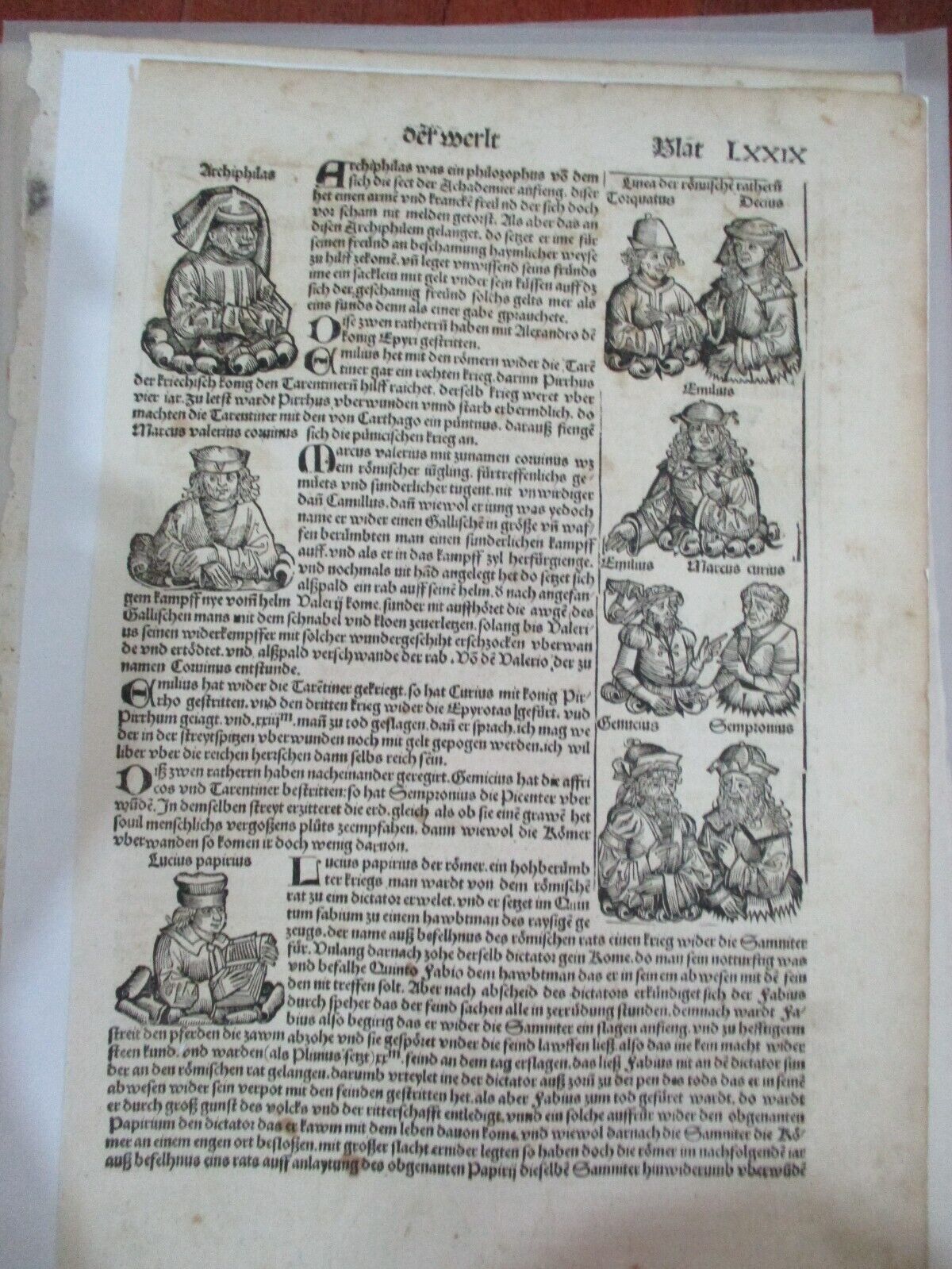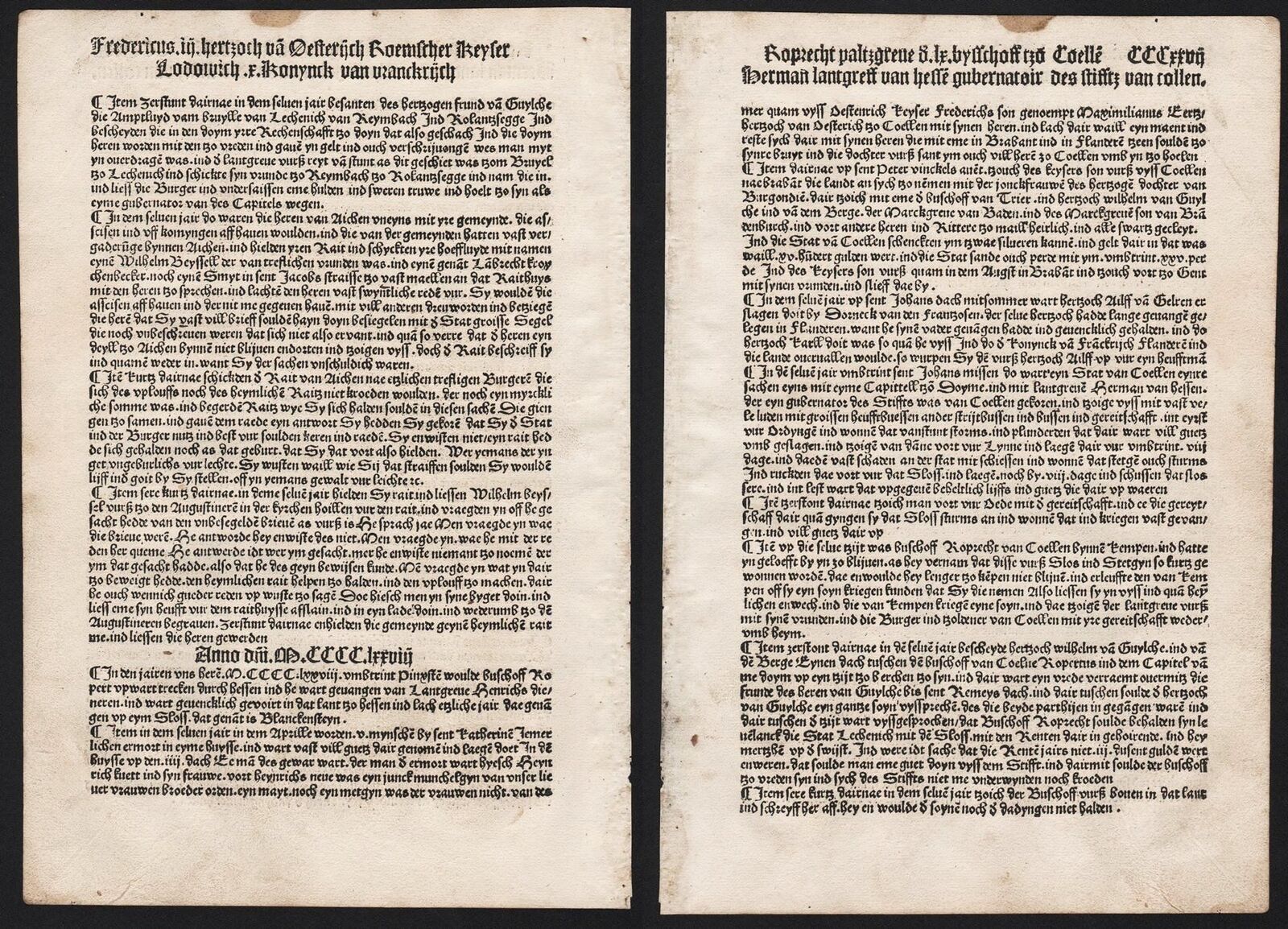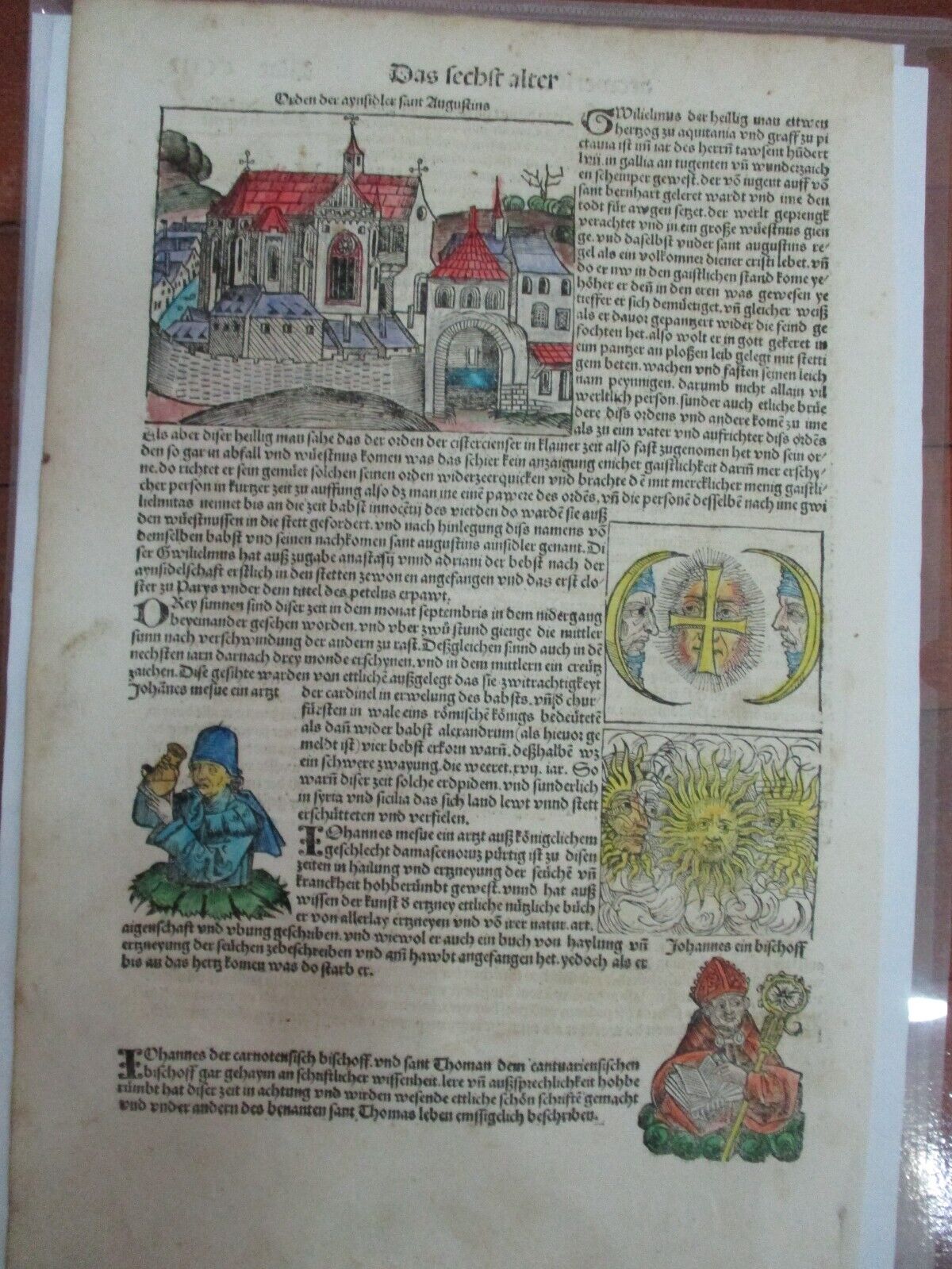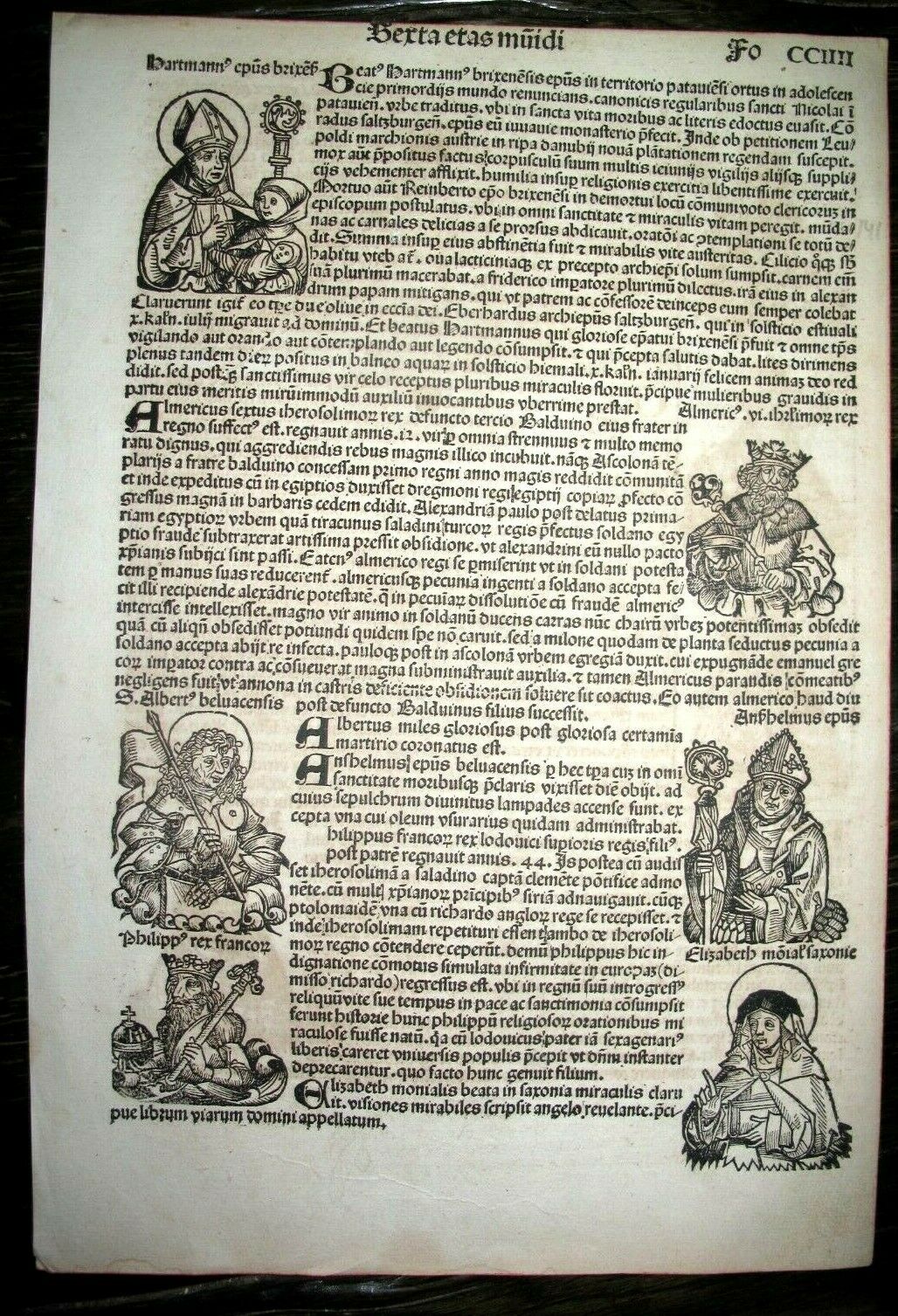-40%
Page 79 of Incunable Nuremberg chronicles , done in 1493 .
$ 84.48
- Description
- Size Guide
Description
This is the page 79 from the famous book the chronichles of nuremberg , so far so on the history of the world as they sawuntil 1493
This page is very dense related to the history it explain. Talk about many kings of the Oriental European area
The king Seleucus Ceramos
Histories about facts of Antiochia , Siria and some religious cismas that happened in that age.
Talk about famous politicians of the epoch and their achivements for the history.
reference:
https://en.wikipedia.org/wiki/Lucius_Papirius_Cursor
365-310 BC Aprox
FOLIO LXXIX recto
Arcesilaus (Archiphilas) was a philosopher with whom the sect of the Academicians began. He had a poor sick friend, who for shame would not make his condition known. But when Arcesilaus learned of this, he gave secret assistance to his friend. Without his knowledge he placed a small bag of money under his pillow so that he would consider it as something he had found rather than as a gift.
Arcesilaus, here called Archiphilas, was the founder of the New Academy, and flourished c. 200 BCE. In his youth he came to Athens to study rhetoric, but becoming the disciple first of Theophrastus, and afterward of Crantor, he found his inclination led to philosophical pursuits. Not content, however, with any single school, he left his early masters and studied under skeptical and dialectic philosophers. He was not without reputation as a poet, and several of his puns and witticisms have been preserved, which give the idea of an accomplished man of the world rather than a grave philosopher. Although his means were not large, many tales are told of his generosity. His enemies accused him of the grossest profligacy, and it must be confessed that the accusation is slightly confirmed by the circumstance that he died at the age of 76 from a fit of excessive drunkenness.
On the death of Crantor, Arcesilaus succeeded to the chair of the Academy, in the history of which he makes so important an era. In his time philosophy was absorbed in the single question of the grounds of human knowledge. According to Cicero he summed up his opinion in the formula "that he knew nothing, not even his own ignorance." Arcesilaus is also said to have restored the Socratic method of teaching in dialogues. The Stoics were his chief opponents. The New Academy does not seem to have doubted the existence of truth in itself, but our capacity to obtain it.
These two consuls (referring to the dual portrait of Torquatus and Decius) fought with Alexander against the king of Egypt.
This Aemilius with the Romans waged a most just war against the Tarentines; and so with Pyrrhus, king of the Greeks, bringing aid to the Tarentines, he fought for more than four years. Finally, with Pyrrhus defeated, and having died miserably in his country, the Tarentines entered into a peace treaty with the Carthaginians. And from this the Punic Wars had their beginnings.[A paragraph of extreme historical compression. Pyrrhus (318-272 BCE) was king of Epirus in Greece, and, in one of his many bids to expand his empire, assisted the Greek city-state of Tarentum in southern Italy in 280. Some of his battles, though successful, cost him such staggering losses (most notably against the Italian town of Asculum in 279), that the phrase ‘Pyrrhic victory' was created to describe a victory that was so costly that it had become, in reality, a loss.]
Marcus Valerius, nicknamed Corvinus, was a Roman youth of truly excellent spirit and singular virtue no less unworthy than Camillus. And he himself, though still a youth, engaged in battle against a man of Gaul who was singularly distinguished by his size and his armor. And while he, in armor, proceeded into the middle (of the field to do battle), and had not yet guarded his hand with his shield, a raven suddenly sat on his shield and, from the beginning of the battle, never departed from Valerius' shield. And with the tip of its beak and its talons it did not stop wounding the eyes of the Gaul until Valerius had killed the enemy terrified by such a monstrous portent. And with him dead, immediately the raven vanished from sight. And Valerius then was called by the name Corvinus.[According to legend, Marcus Valerius (who was reputed to have lived to 100 years of age, c. 370-270 BCE) acquired the nickname Corvinus (
corvus
= ‘Raven') because, when serving as military tribune under Camillus in 349 BCE, he accepted the challenge of a gigantic Gaul to single combat, and was assisted in the conflict by a raven that settled upon his helmet, and flew in the face of the barbarian. He was six times consul and twice dictator, and by his military ability rendered the most memorable services to his country. His most brilliant victories were gained in his third consulship, 343, when he defeated the Samnites at Mt. Gaurus, and at Suessues. In his other consulships he repeatedly defeated the Etruscans and other enemies of Rome. He is frequently referred to by the later Roman writers as a memorable example of the favors of fortune. (Livy, 7.26-42, 10.2-11.)]
These two consuls (referring to a dual portrait of Gemicius and Sempronius) reigned after one another. Gemicius (Gemitius) conquered the Africans (Affros) and Tarentines (Tharentinos); and Sempronius defeated the Pisans (Picentes). In that battle the earth shook as if it dreaded to receive all the blood that was spilled, and few of the Romans who were victorious escaped.
Lucius Papirius, a Roman patrician and very celebrated warrior, was elected dictator by the Roman senate; and he appointed Quintus Fabius Master of the Cavalry. At the command of the Roman senate he undertook a war against the Samnites. Before long the dictator went to Rome, where he was needed; and he instructed Quintus Fabius, the commander, not to engage the enemy in his absence. But after the dictator left, Fabius learned through spies that there was disorder among the enemy. This made him anxious to engage them; and he attacked the Samnites. And to make the battle more violent he removed the bridles from the horses, and spurred them into the enemy. And no power could withstand them. As Livy states, 20,000 of the enemy were slain on that day. Fabius did not make this known to the dictator, but to the Roman senate. The dictator condemned him to death because, contrary to his command, he had engaged the enemy in his absence. But when Fabius was led to execution, he was released through the good will of the people and of the nobility. And there was such a tumult against the dictator that he barely escaped with his life. And although the Samnites afterwards surrounded the Romans in a narrow region and defeated them in a great battle, yet in the following year the Romans defeated the Samnites on the order of the senate with Papirius as their leader. With that victory he celebrated a triumph.[See Folio LXXVI verso (Papirius) and note.]
This page was restaurated by the museum i bought to. It was ripped in the left margin and have a tape fixing a ?break?
hard to see. Anyway does not affect not the page nor the text nor any image. All is clearly visible
From
Hartmann Schedel
Original Page
















